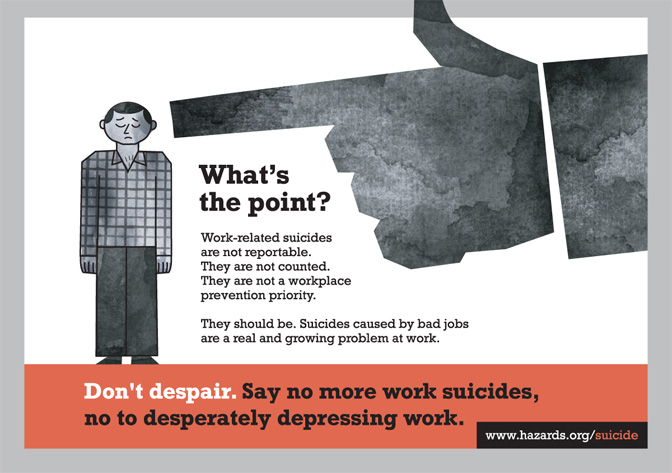In 2003, Hazards was a lone voice warning of a looming workplace suicide crisis (Hazards 83). A ‘Drop dead’ feature noted that, along with heart disease and stroke, suicide was “the thoroughly modern way to die at work.”
It took until 2017 before the government, releasing figures that showed there was a strong link between suicide and occupation, admitted there was a problem (Hazards 137). The new figures showed skilled male labourers, including construction workers, are three times more likely to take their own lives than the national average. Other groups with an increased risk are nursing staff, primary teachers and agricultural workers.
But as the TUC observed last year, “there are no known cases in the UK where an employer has been prosecuted after a worker has taken their own life because of the pressure they were under at work.
“This is despite the Corporate Manslaughter and Corporate Homicide Act and the Health and Safety at Work Act both potentially applying if it can be shown that the suicide was a result of the employer’s actions” (Hazards 141).
Suicide watchdog?
One stand out reason is that work-related suicide is a deliberate blindspot for the UK Health and Safety Executive (HSE). The official workplace safety regulator’s reporting webpages note: “All deaths to workers and non-workers, with the exception of suicides, must be reported if they arise from a work-related accident, including an act of physical violence to a worker.”
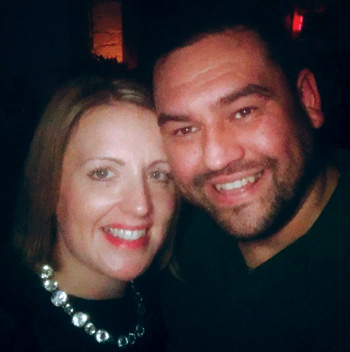
JOB DREAD A North Yorkshire Police dog handler who could no longer do his dream job because of a work injury killed himself the day before he was due to return to work in another role. A March 2019 inquest heard Mick Atkinson, 37, 'dreaded' the prospect of working in an office after more than 10 years as a dog handler. The police officer (pictured with his partner, Kellie) was found hanged in the garage of his home on 7 October 2018. He had been off work for 17 months due to arthritis in his knee caused by the work injury. more
And HSE’s 2014 investigation guidelines instruct its workplace inspectors to steer clear. It tells inspectors, when deciding which incidents should be investigated, they should include: “All work-related accidents which result in the death of any person, including non-workers. ‘Accident’ specifically excludes suicides and deaths from natural causes.”
It is a problem not even on HSE’s radar. HSE’s Foresight Centre runs an ‘horizons scanning’ project intended to ensure its regulatory and advisory approach anticipates and adapts to changing work and emerging health and safety challenges.
Its March 2019 ‘Foresight Report: The future world of work and workplace health’ makes repeat reference to rise of stress as dominant concern, and of the increasingly incidence of psychological and physical harm that inevitably accompanies it.
While HSE’s horizon scanning delves into topics including “robot realities”, “the hydrogen economy” and “towards Generation Z”, and HSE’s Health and Work Strategy has “work-related stress and related mental health issues” as one of its three priorities, occupational suicide is not in HSE’s current or future plans.
Like the Foresight Report, the strategy doesn’t mention suicide.
We know, you know
It is a non-engagement strategy that means HSE does not recognise, record or respond to copper-bottomed evidence of a fatal malaise in the workplaces where protection is needed most. It’s not that this is speculation or a concentration on a theoretical future risk. New evidence exposing a current and developing work suicide crisis is emerging all the time.
A 2018 study found work factors including poor job insecurity and job control are strongly linked to higher suicide risks and that prevention efforts could have ‘large population impacts’.
The paper, which reviewed 22 independent studies and was published in the journal Occupational and Environmental Medicine, found: “Across this broad range of studies, results of this review suggest that exposure to various psychosocial job stressors was associated with elevated risk of suicide ideation, attempts and death. Job insecurity was associated with higher odds of suicide ideation, while job control appeared to be more of a risk for suicide attempt and death.”
A 2019 French public health agency study published in the Bulletin épidémiologique hebdomadaire (BEH) found 4.5 per cent of French females and 3.1 per cent of males reported suicidal thoughts in 2017, or 3.8 per cent overall. In more than a third of cases, working conditions were stated as the cause. The most important factor was fear of losing the job, followed by verbal threats, humiliation and intimidation at work.
Even if a much lower proportion of actual suicides were related to work factors, with 5,500 plus UK suicides each year, it would still point to hundreds of work-related suicide deaths annually.
While they are barred from the official workplace death statistics, work-related suicides are not all hidden.
Management by terror

NO AMNESTY Amnesty International has ‘dissolved’ its senior leadership team after an internal review said it had a “toxic” workplace and a union said it was not feasible for the top tier of managers to remain. The review came after two Amnesty workers, Rosalind McGregor, 28 (above), and Gaëtan Mootoo, 65, (below) killed themselves after facing excessive pressures at work. more

This year, following two staff suicides, more than 600 members of staff at Cardiff University signed an open letter to the university's leadership, urging them to safeguard workers from the pressures of excessive workloads (Hazards 145).
Dr Malcolm Anderson, 48, jumped from a window at the university’s Business School on 19 February 2018, leaving a note referring to his long hours and work pressures (Hazards 143). Dr Mark Jervis, 62, who had also struggled with problems at work and a spiralling workload, killed himself in his office in the university’s School of Biosciences on 11 March 2014.
In May 2019, London-based Amnesty International “dissolved” its senior management team after two staff suicides in 2018 and reports critical of a “toxic” workplace.
Bad employers face more serious consequences in France, where work-related suicides have to be reported by law. A long-awaited trial in Paris that started in May 2019 heard telecom giant Orange and seven former or current managers accused of moral harassment and associated charges related to a spate of suicides at France Telecom between 2007 and 2010.
The defendants include France Telecom’s former president Didier Lombard, human resources director Olivier Barberot and deputy executive director Louis-Pierre Wenes. They are accused of having “degraded work conditions of personnel that risked hurting their rights and dignity, altering the physical or mental health (of personnel), or compromising their professional future.”
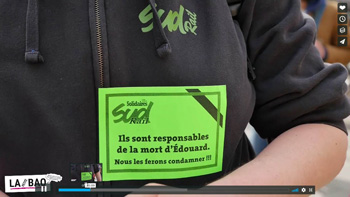
FRENCH LESSON Unions in France have made occupational suicide a major campaign priority. Bosses implicated in work-related suicides could face jail time.
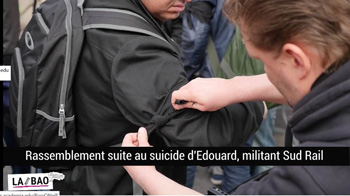
In France, moral harassment can be punished by a year in prison and a fine of 15,000 euros (£13,000). Communications’ unions and victims’ organisations rallied outside the courthouse.
A joint union statement issued as the trial commenced noted: “We’re hoping for an exemplary judgment, so business leaders who could potentially be tempted by these management methods are warned they cannot act with total impunity.” Echoing the words of one suicide victim, it added: “No to ‘management by terror’!”
The Solidaires trade union, which launched a work suicides campaign in April 2019, is now compiling a geographical map of work-related suicides in France, with case reports collated by union activists.
Crime of omission
In the UK, the communication union CWU is calling on the government to take workers’ suicides and mental health more seriously. Delegates at the union’s April 2019 conference demanded that workplace suicide be recognised in law.
SPACED OUT Yukinobu Sato, a contractor working on a project for the Japan Aerospace Exploration Agency (Jaxa) took his own life in 2016 because he was overworked, Japanese authorities have ruled. The decision was announced at a press conference attended by Sato’s mother, Hisae Sato. more
CWU national executive committee member Tracey Fussey said: “The mental health of the British workforce is in rapid deterioration. There is one suicide every two hours, yet it remains an issue not reflected in government legislation.”
Train drivers’ union ASLEF this year called for suicides precipitated by incidents while working to be treated as work-related fatalities. ASLEF general secretary Mick Whelan was speaking after a May 2019 inquest heard train driver Scott Walker, 43, killed himself in November 2018, just months after a suicidal pedestrian was killed after walking in front of his train.
Whelan said: “Our thoughts are with everyone who has been affected by these deaths, especially the families and the friends of those who lost their lives. We believe all incidents of this nature should be treated as work-related and will start campaigning to this end.”
Unions have warned that HSE’s refusal to deal with or record suicides artificially depresses the true toll of work-related fatalities and deflects attention from the need for preventive measures at work.
HSE, meanwhile, maintains stress prevention is one of its top prevention priorities.
But if HSE isn’t willing to investigate or record the most deadly, desperate consequence of terror, trauma and tyranny at work, it suggests the safety regulator’s priorities are fatally flawed.
PC’s work injury led to ‘dreaded’ job change and suicide
A police dog handler who could no longer do his dream job as a result of a work injury killed himself the day before he was due to return to work in another role, an inquest has heard. Wakefield Coroner's Court was told 37-year-old PC Mick Atkinson 'dreaded' the prospect of working in an office after spending more than 10 years as a dog handler with North Yorkshire Police.

The police officer was found hanged in the garage of his home near Leeds on 7 October 2018. He had been due to return to work the following day after a 17-month absence due to arthritis in his knee caused by an injury at work. Recording a verdict of suicide, assistant coroner Sarah Watson, said: “It seems his job was his life, certainly being with the dogs and being outdoors.”
He underwent an unsuccessful knee operation in April 2017 and could not return to work. The inquest heard that after the operation Mick’s police dogs were reallocated, which upset him.
His partner, Kellie Taylor, wrote in a statement to the inquest: “Obviously he could not see a way out. He had health and work issues. He was a wonderful man and will be sadly missed.”
North Yorkshire Police chief constable Lisa Winward commented: “Mick was a distinguished officer and had been part of the North Yorkshire Police family for 17 years. He started his service as a PC in Scarborough and then moved into the Dog Support Unit and became a handler. He was a well-liked and much respected member of the team and of our wider policing family and his loss will be felt profoundly.”
She added: “His death has come as a great shock to all of us and our thoughts are with his family, friends and colleagues at this extremely difficult time.”
Amnesty dissolves ‘toxic’ leadership team


Amnesty International has ‘dissolved’ its senior leadership team after an internal review said it had a “toxic” workplace and a union said it was not feasible for the top tier of managers to remain.
The human rights organisation's secretary-general, Kumi Naidoo, ordered the independent review after two employees killed themselves last year. This found that “39 per cent of Amnesty International staff reported that they developed mental or physical health issues as the direct result of working at Amnesty.”
The review concluded “organisational culture and management failures are the root cause of most staff wellbeing issues,” and pointed to an “us versus them” dynamic between employees and management. The senior leadership team subsequently accepted responsibility and all seven offered to resign.
This move came on the heels of Unite, the union representing Amnesty staff, declaring it had no confidence in the organisation’s senior management and indicating it was “infeasible” they could remain. Unite official Alan Scott commented: “toxic and dysfunctional working culture at Amnesty. It is absolutely intolerable that workers at Amnesty experience bullying, targeting and power misuse and the previous leadership team must take full responsibility for these failures” (Hazards 145).
Five of the seven senior leaders, based mainly in London and Geneva, are now believed to have left or are in the process of leaving the organisation. An Amnesty International spokesperson said: “The former Senior Leadership Team, which comprised of seven directors, has been dissolved and a new transitional team is in place until all of the positions in the new four-person Coalition Leadership Team are filled. This is expected to be completed by the end of 2019.”
In May 2018, Gaëtan Mootoo (above right), 65, killed himself in Amnesty's Paris offices. He left a note talking of work-related stress and overwork (Hazards 144). The independent review found he was unhappy over a “justified sense of having been abandoned and neglected”. Six weeks later, Rosalind McGregor (above left), 28, a British intern working at Amnesty's Geneva office, killed herself at her family home in Surrey.
Japanese space agency suicide caused by overwork
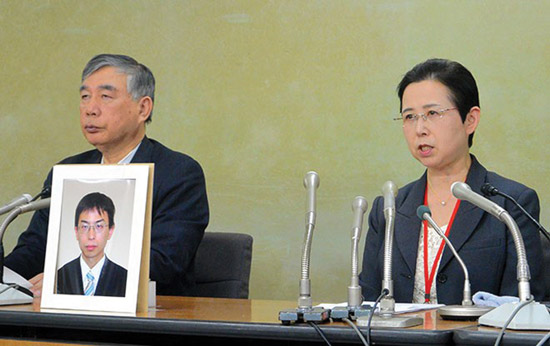
A man working on a project for the Japan Aerospace Exploration Agency (Jaxa) took his own life in 2016 because he was overworked, Japanese authorities have ruled. Yukinobu Sato, aged 31 at the time, was working as a contractor on a satellite project for Jaxa and was under extreme stress, a compensation review by the Ibaraki Labour Bureau’s Tsuchiura Labour Standards Inspection Office concluded.
According to his family's lawyer, Hiroshi Kawahito, who held a news conference at the labour ministry in Tokyo on 3 April, the labour authorities recognised that the young man was assigned “an unachievable quota” at work. Sato also had difficulties with his boss, and his workload was increased just before his death.
Determining his death was work-related, the labour office cited the heavy physical and psychological stress Sato was put under, which led to an adjustment disorder, ultimately causing him to end his life. Kawahito pointed out that Sato worked a highly demanding shift for the control operation, requiring intense concentration. He worked 16-hour overnight shifts seven times a month.
After he started to take on heavier responsibilities at work in September 2016, his overtime hours reached 70 or more per month. When Sato tried to claim the overtime, his boss gave him a warning, forcing him to work the extra hours without pay. The boss repeatedly ordered Sato to redo his work without giving concrete explanations. On the day Sato died, he was reprimanded by the boss for about 30 minutes.
Mr Sato's employer, Software Consultant, said it would take measures to prevent future incidents, while Jaxa said it would assess the situation to see if it could improve any of its own policies. Japan has introduced a law to try to end the culture of long working hours.
The legislation, which came into force in April 2019, limits overtime work to 45 hours a month and 360 hours a year in principle. Companies that violate the rules could face fines of up to 300,000 yen (£2,046). There were an estimated 200 deaths linked to overwork in Japan in 2017.
Don't despair
Work-related suicides are the forgotten workplace killer. But after one ‘toxic’ organisation disbands its top management team and the French courts put three top bosses linked to a suicide epidemic in the dock, Hazards editor Rory O’Neill explores the growing pressure for prevention.
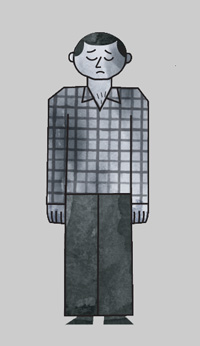
| Contents | |
| • | Introduction |
| • | Suicide watchdog? |
| • | We know, you know |
| • | Management by terror |
| • | Crime of omission |
| Related stories | |
| • | PC’s work injury led to ‘dreaded’ job change and suicide |
| • | Amnesty dissolves ‘toxic’ leadership team |
| • | Japanese space agency suicide caused by overwork |
| Resources | |
| Hazards | |
| • | Work-related suicide webpages. |
| • | Work and suicide prevention checklist, Hazards, 2018. |
| TUC | |
| • | Work and suicide: A TUC guide to prevention for trade union activists January 2018. |

